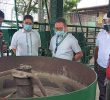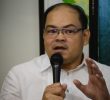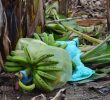By Tyrone Velez and Myrah Acuzar, Davao Today intern
DAVAO CITY – American, European and Japanese chambers of commerce have signed an agreement to form a Southern Mindanao Growth Corridor to open investments here in Mindanao that will serve as their gateway for the Asian market.
The American chamber’s vigorous interest to gain foothold in Mindanao trade is complemented by its current active lobbying in Congress to lift foreign ownership limits in the Philippine Constitution or Charter Change (Cha-Cha).
According to Ibon Foundation, US businesses are actively lobbying for Cha-cha. IBON cited the The Arangkada Philippines Project (TAPP), which is being implemented by the American Chamber of Commerce whose activities include lobbying in Congress to implement the policy proposals of the Joint Foreign Chambers of Commerce (JFC), among them the lifting of foreign ownership/participation limits imposed by the Constitution.
The signing of the Southern Mindanao Growth Corridor was held April 21 at Kapehan sa Dabaw at SM Ecoland with American Chamber of Commerce in the Philippines Davao (AMCHAM Davao) President Philip Dizon, European Chamber of Commerce in the Philippines, (ECCP) Vice President Martial Beck and Japanese Chamber of Commerce in Mindanao (JCCM) President Keisuke Nakao.
“Investors from many countries outside ASEAN want a foothold in this vital global market segment, and South Mindanao is a prime area where they can place their investments to serve the markets of Malaysia, Indonesia, Singapore and other ASEAN countries,” Dizon said.
The American Chamber’s aggressive trade partnership with Mindanao, however, might come with a hefty price: changing the Philippine Constitution.
US is said to be increasing its pressure on the Philippines to ease or remove the constitutional restrictions on foreign ownership or participation if the country intends to join the US-led Trans-Pacific Partnership free trade agreement.
Recently, according to Ibon, the Office of US Trade Representative listed the various restrictions imposed by the 1987 Constitution on foreign ownership and participation as among the so-called barriers to US trade. The list includes 30% constitutional limit on foreign ownership in advertising; 40% limit on foreign investment in the operation and management of public utilities; ban on foreigners to practice law, medicine, nursing, accountancy, engineering, architecture and customs brokerage; and restrictions on foreign ownership of land.
American Chamber’s Dizon said Mindanao’s potential in agriculture and its skilled and English-speaking workforce has advantages over other Asian countries to lure investors.
He added that the region’s rich raw materials can feed the need for different manufacturing enterprises.
“Our region will add significant value to what we can already offer and help our people land good jobs,” he added.
ECCP VP Beck also emphasized European companies’ interests to invest in agricultural products in partnership with their biotechnology.
Beck said products such as coconut water are attracting investors searching for natural health drinks for athletes.
He clarified that the investments would benefit local business since the value added of the products is made here.
“It’s been our vision, we have the technology and you have the resources. The idea is not just to extract and work on it abroad, but to develop it here,” said Beck.
Beck said the ECCP’s 28 country-members could have potential to invest here including countries from France, UK, Spain Norway, Denmark, and even Poland and Czech Republic, eyeing potential investments in textiles, electronics and manufacturing.
There are 500 European investments in the country including the Swiss-owned Nestle in Cagayan de Oro and Germany’s Steag.
Beck said that they are hoping the establishment of Philippine Economic Zone Authority (PEZA) areas in Mindanao could be made soon to facilitate investments.
The heads of chambers also said their union is borne out of positive climate brought by the peace pact signed by the government with the Moro Islamic Liberation Front to craft an autonomous entity for the Bangsamoro.
But the heads of chambers are also hoping for more support in the region’s agriculture.
Nakao, whose company is exporting frozen mango in Davao for 11 years, said Mindanao has the potential in agriculture, but the challenge is to come up with variety and value added products.
Dizon said the government has lacked foresight to promote the region’s agri-industry.
“There is the mindset to promote few agriculture products. Our advantage is our being strategic in location, but there is lack of foresight such as government providing technology to the farmers and choosing products to market,” said Dizon.(davaotoday.com)










